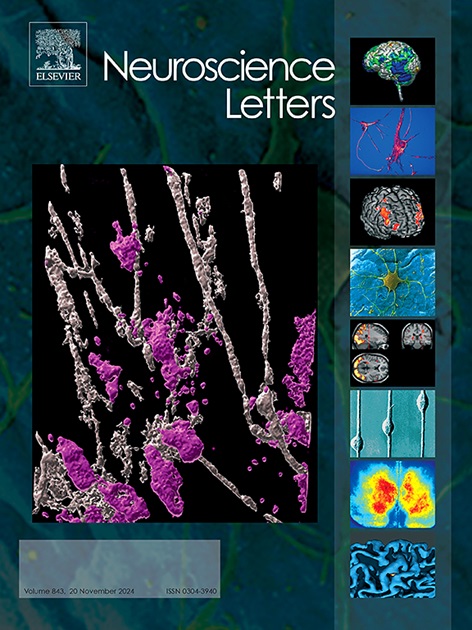Maternal exercise during pregnancy: Sex-specific impacts on offspring memory and maternal deprivation effects
IF 2.5
4区 医学
Q3 NEUROSCIENCES
引用次数: 0
Abstract
Maternal deprivation (MD) is a well-established paradigm used to study the effects of early-life stress on offspring brain development and behavior, particularly memory. Maternal exercise (ME) during pregnancy has been shown to influence offspring brain development and behavior. Our study examined whether ME protocols—stop, start, reduce, or maintain running during pregnancy—could protect offspring from MD-induced memory deficits and impact hippocampal oxidative balance. Initially, adult Wistar female rats were divided into five groups: non-exercised mothers (NE), mothers who exercised only before pregnancy (PRE), mothers who exercised before and reduced the intensity during pregnancy (RED), mothers who exercised at the same intensity before and during pregnancy (EQUAL), and mothers who started exercise during pregnancy (GEST). After delivery, the groups were subdivided into control (CT) and MD. At 90 days of age, the offspring underwent an object recognition (OR) memory test, and hippocampal lipid peroxidation and catalase (CAT) levels were measured. MD-induced memory deficits in male but not female offspring. Only the male PRE group showed a memory deficit, while all other exercise protocols prevented the MD-induced deficits. MD did not affect hippocampal cell membrane peroxidation, and PRE and EQUAL protocols increased catalase levels compared to NE + CT controls. Our results highlight that maintaining or starting exercise during pregnancy mitigates memory deficits induced by MD, particularly in male offspring.
怀孕期间的母亲运动:对后代记忆和母亲剥夺效应的性别特异性影响
母亲剥夺(MD)是一个公认的研究早期生活压力对后代大脑发育和行为,特别是记忆影响的范式。怀孕期间的母亲运动(ME)已被证明会影响后代的大脑发育和行为。我们的研究考察了ME方案——停止、开始、减少或维持妊娠期间的跑步——是否可以保护后代免受md诱导的记忆缺陷和影响海马氧化平衡。最初,成年Wistar雌性大鼠被分为五组:不运动的母鼠(NE),只在怀孕前运动的母鼠(PRE),在怀孕前运动并在怀孕期间减少运动强度的母鼠(RED),在怀孕前和怀孕期间运动强度相同的母鼠(EQUAL),以及在怀孕期间开始运动的母鼠(GEST)。分娩后,将各组再分为对照组(CT)和对照组(MD)。在90日龄时,对后代进行物体识别(OR)记忆测试,并测量海马脂质过氧化和过氧化氢酶(CAT)水平。md引起的雄性后代记忆缺陷,但雌性后代没有。只有男性PRE组表现出记忆缺陷,而所有其他运动方案都可以防止md引起的缺陷。MD不影响海马细胞膜过氧化,与NE + CT对照相比,PRE和EQUAL方案增加了过氧化氢酶水平。我们的研究结果强调,在怀孕期间保持或开始锻炼可以减轻MD引起的记忆缺陷,特别是在男性后代中。
本文章由计算机程序翻译,如有差异,请以英文原文为准。
求助全文
约1分钟内获得全文
求助全文
来源期刊

Neuroscience Letters
医学-神经科学
CiteScore
5.20
自引率
0.00%
发文量
408
审稿时长
50 days
期刊介绍:
Neuroscience Letters is devoted to the rapid publication of short, high-quality papers of interest to the broad community of neuroscientists. Only papers which will make a significant addition to the literature in the field will be published. Papers in all areas of neuroscience - molecular, cellular, developmental, systems, behavioral and cognitive, as well as computational - will be considered for publication. Submission of laboratory investigations that shed light on disease mechanisms is encouraged. Special Issues, edited by Guest Editors to cover new and rapidly-moving areas, will include invited mini-reviews. Occasional mini-reviews in especially timely areas will be considered for publication, without invitation, outside of Special Issues; these un-solicited mini-reviews can be submitted without invitation but must be of very high quality. Clinical studies will also be published if they provide new information about organization or actions of the nervous system, or provide new insights into the neurobiology of disease. NSL does not publish case reports.
 求助内容:
求助内容: 应助结果提醒方式:
应助结果提醒方式:


